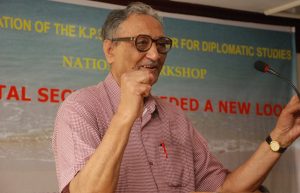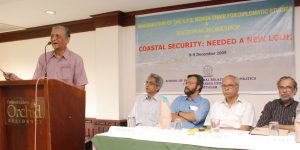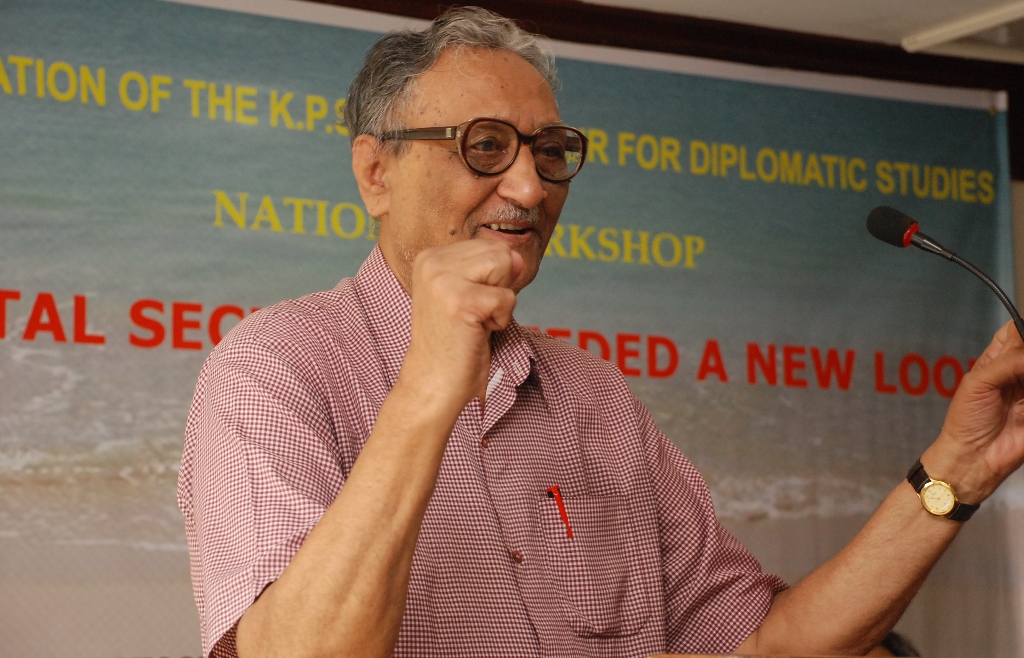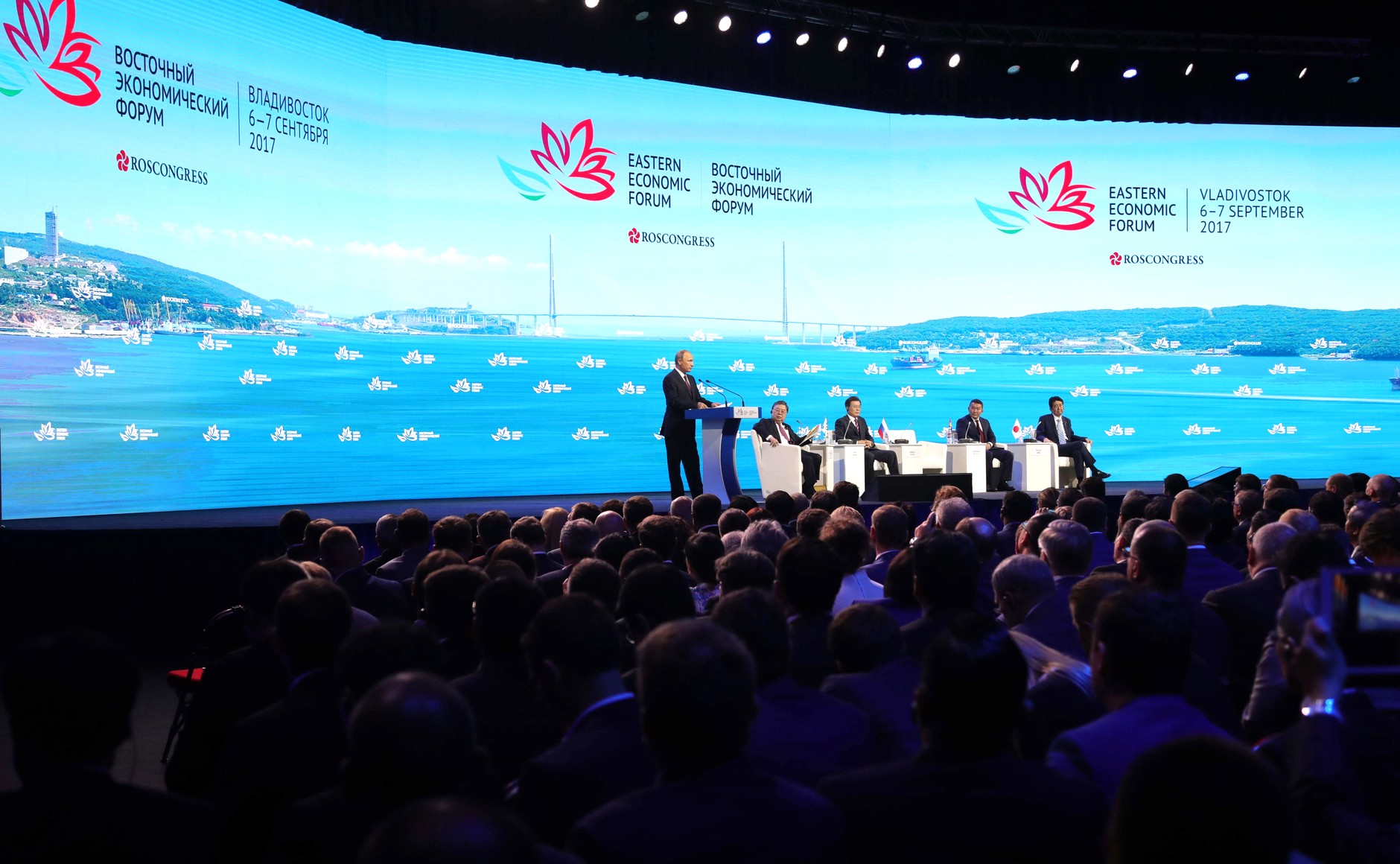An IR Scholar with Practical Wisdom – Prof K.R. Singh (1932-2018) Remembered
KM SEETHI
First Published in Countercurrents, 26 June 2018

There are not many International Relations (IR) scholars in India who can make a reasonable claim that their scholarship means many things for the foreign as well as the defence policy decision-makers in the country. K.R. Singh belonged to such a genre of scholarship embedded in a typical Aristotelian notion of Phronetic (practical wisdom) studies. Singh always sought to combine theoretical knowledge with ground level/practical realties and inputs. This was perhaps the reason why he was very much in demand in academia as well as in policy-making circles.
K.R. Singh, who passed away in Delhi at the age of 86 was a distinguished Professor of International Relations in Jawaharlal Nehru University (till 1997) and the first Scholar-in Residence (2009-10) of the KPS Menon Chair for Diplomatic Studies, School of International Relations and Politics, Mahatma Gandhi University. Singh was a well-respected teacher and researcher at the West Asian Studies, JNU for quite a long time. Besides his long stint as Professor, Singh also served as Director, National Security Programme, JNU, Editor in Chief of International Studies Quarterly and Visiting professor, Chair for Maritime Studies (2005-2008), University of Calicut.
K.R. Singh never considered that his scholarship should be limited to West Asia and North Africa studies. He did considerable research and studies on the Indian Ocean and maritime security. Singh travelled extensively in several countries of South Asia, South-East Asia, West and North Africa as well as France, Germany, Sweden, UK, USA, erstwhile USSR States and Australia.
KR Singh was happy that eventually India had “awakened from its deep slumber and rediscovered its maritime heritage.” Many of his studies and writings were the essential texts of India’s maritime security. In writing a foreword to his Maritime Security of India, Admiral Arun Prakash IN (Retd) says that many of his “analyses and evaluations of capabilities, situations, weapon systems and warfare areas are surprisingly accurate.” He says that “whether they agree with him or not, maritime strategists as well as naval officers would be greatly interested in some of the prognostications and suggestions offered by him.”
Prof V. Suryanarayan, a former colleague of KR. Singh and President of the Chennai Centre for China studies says that “on matters relating to coastal security and maritime co-operation his contributions were immense. The concept of Bay of Bengal Community was his idea, but in different parts of the country I have been wrongly given the credit.” He said that “what endeared KR Singh was the fact that he had lot of time for his students and juniors….He had to surmount a lot of difficulties in the old Indian School of International Studies (which later became part of JNU). But by dint of hard work, perseverance and single minded determination he came up in life and was undoubtedly the foremost Indian scholar in maritime Studies. He was a role model for many.”
During his tenure as the KPS Menon Chair at Mahatma Gandhi University, KR Singh was instrumental in organizing a workshop on “Coastal Security: Needed A New Look” in collaboration with the Ministry of External Affairs, Government of India, Ministry of Defence, Government of India, The Coast Guard, Ministry of Home, Ministry of Defence, Ministry of Home, Government of Kerala etc. It was a tremendous success in terms of the participation of all stakeholders, as well as the policy–relevant recommendations made to the State and the Union Governments. Later, the papers of the workshop were brought together in a volume edited by KR Singh and myself.

KR Singh never compromised his commitment to IR studies. He wrote and lectured on a wide variety of topics in India and abroad. His scholarship, deep insights and knowledge in the politics and foreign polices of West Asian countries brought forth many books and articles. Speaking on the Palestinian tragedy, KR Singh once said that it is “related to two sets of betrayals.” The first betrayal was by “liberal-democratic world that not only refused to grant the people inhabiting the mandated territory of Palestine the right of self-determination but also divided the territory to give a minority an independent State.” The second betrayal was by “the Arabs who, while seeking to represent the interests of the Palestinian Arabs, occupied the territory allocated to them under the General Assembly’s partition resolution.” It was “Trans-Jordan which incorporated West Bank and the old city of Jerusalem to form the new state of Jordan.” Egypt had occupied the Gaza Stip and retained it as a province. Thus, within one year, Palestinians lost their ‘Statehood’ as also their territory and were reduced to the level of refugees in their own homeland in Gaza and West Bank, according to Singh.
KR Singh also pointed out that the Palestinian situation today “is caught between two sets of hardliners who have non-negotiable set of demands.” For Jews, “the territory is ’God’s Gift’ to them. For the Palestinians, it is a waqf and hence non-negotiable. Under such circumstances, negotiated settlement is not possible for some time to come. It will have serious repercussions for peace and stability in the region besides, adding fuel to fire of so called ‘international jihadi movement.”
KR Singh said that the roots of contemporary Islamic radicalism need to be searched in the Islamic resurgence since the mid-19th century when the Islamic elite began to debate the reasons for the decline of great Muslim powers like the Ottoman, Persian and Mughal empires. It led to the creation of two trends or schools of thought: the rejectionists and the assimilationists. These trends got support from the ruling elites, thereby giving a political orientation to the theological debate. He said that the radical Islam got a boost since the Iranian revolution and the Soviet intervention in Afghanistan. The Afghan crisis evoked a different set of responses. The resistance was not based on Afghan nationalism, but on Islamic Jihad. It led to the formation of different armed groups that represented ethnic and geographical loyalties rather than on Afghan resistance per se. Thus, the concept of Jihad was deliberately fostered by Pakistan, Saudi Arabia and the US for their own different reasons. An attempt was also made to send radical Islamists from all over the world. KR Singh pointed out that the “West is now facing the backlash of their own deeds in the past. He also said that “India has been unwillingly sucked into the neo-cold war or war on terror.” The question is “whether India has a coherent policy to respond to these challenges.”
KR Singh had reminded that “whenever the United States accuses some governments or regimes of human rights violations, it may be a prelude to an invasion or intervention in the country concerned.” He said that the time has come to rethink about the widely held-perception that “the Shah of Iran was a stooge of American imperialism. The fact of the matter was that the US tried to undermine the position of the Shah even in the mid-1970s and stopped military assistance. Singh also pointed out that during the crucial period of Iranian revolution, the US had even propped up a section of Shia community against the Shah regime. The Shah, on the other hand, had banked upon the Soviet Union for military assistance. The Soviet Union had, in fact, been interested to sustain its friendly relations with Iran and, in the post-socialist phase also Russia continues this pattern of friendship for geo-political and geo-strategic reasons.
During his late years, KR Singh was more enthusiastic in undertaking studies on the Indian Ocean, maritime security, energy security etc.
Dr. Singh has to his credit several books and hundreds of articles in national and international journals. The most prominent of his books include The Indian Ocean: Big Power Rivalry and Local Responses (1977), Iran: Quest for Security (1980), The Persian Gulf: Arms and Arms Transfer (1980), Intra-Regional Interventions in South Asia with Special Reference to India’s Policy (1990), The Gulf Crisis (1991), Post-War Gulf: Implications for India (1992), Making of an Indian Ocean Community, Indira Gandhi Memorial Trust(1995), Indo-Gulf Co-operation in Maritime Security, Gulf Studies Programme (2000), Navies of South Asia (2002), New Challenges to Maritime Security: Legality and Legitimacy of Responses (2006), Indian Ocean: Great Power Interventions (2006), Maritime Security for India: New Challenges and Responses (2008), Coastal Security: Needed a Relook (edited with KM Seethi), Malabar and Global Maritime Order (Medieval Period)(2009), and Coastal Security-Maritime Dimensions of India’s Homeland Security (2012). His articles appeared in several books as chapters, besides papers regularly published in journals such as, Journal of Indian Ocean Studies, International Studies, Dialogue, Strategic Analysis, Maritime Affairs etc.



